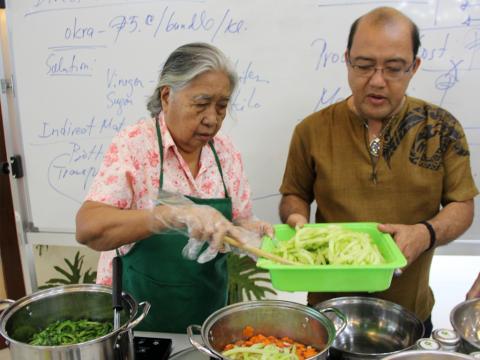Duran Farm’s Luis Bausa assists 80-year-old Gilda Estipona in making pickled ampalaya and sayote. (photo by Daniel Nilo)
DILIMAN, Quezon City—With the unstable farm gate price and oversupply of vegetables in some parts of the country, the Agricultural Training Institute (ATI) sees the need to bring vegetable farming to a new level.
With the potential for higher income in processed vegetables, the ATI’s latest free seminar focused on processing technologies for lowland vegetables.
Luis Bausa, a consultant for the Bulacan-based Duran Farm Agribusiness and Training Center Association, Inc., talked about preparing various pickled vegetables. In a special demonstration, Bausa and some participants made pickled ampalaya, okra, bell pepper, and sayote.
Bausa also gave tips for a productive venture on vegetable processing, “The secret in this business is marketing. You should come up with a product that is unique in your community and you should know how to promote it.”
He encouraged the participants to engage in planting off-season vegetables to increase their chance in selling produce at a higher price. Also, Bausa invited the participants to join the upcoming ATI free seminar on packaging and labelling to further their knowledge on marketing processed vegetable products.
Aside from the processing aspect, retired University of the Philippines professor Valeriana Justo also discussed integrated crop management for lowland vegetables. This includes seed selection, seedling production, land preparation, transplanting, pest and disease management, and nutrient and water management.
The participants were grateful for the technical knowledge shared with them. Eighty-year-old Gilda Estipona from Sorsogon, who had received a text message about the free seminar, was grateful that she came to the event.
“I learned a lot, especially on making pickled vegetables. I could also use what I learned here to improve our small garden at home. I will share this with my neighbors so that all of us will enjoy growth in our livelihood,” she said, while encouraging her co-participants to do the same.
A total of 187 participants came to the free seminar held on February 22, 2019 at the ATI Rural Development Education Center.

